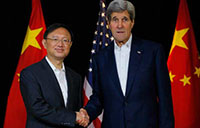HK Supreme Court bans protesters' road blocks
(Xinhua) Updated: 2014-10-20 20:10
 |
| Chinese state councilor urges non-interference in HK affairs |
 |
| Support dwindling for Hong Kong protesters |
The move was made after groups of mini-buses and taxi operators filed for an injunction that would reopen the paralyzed roads in Mong Kok occupied by protesters for the last 23 days.
A lawyer representing the group said the ongoing movement in places like Mong Kok have blocked many roads and disrupted public transport, which inflicted losses on taxi and bus companies.
More scuffles erupted late Sunday, the third turbulent night in Mong Kok following the police's before-dawn operation on Friday, when most of the tents, canopies and barricades blocking main roads in the commercial area in Kowloon for almost three weeks were removed.
Mong Kok is an offshoot protest site across the Victoria Harbor from the main demonstration area in Admiralty where the government headquarters is located.
Hong Kong's Chief Secretary Carrie Lam said Saturday that region's government planned to have formal talks with representatives of the students participating in the Occupy movement on Tuesday, and each side will have five representatives.
Thousands of protesters, mostly students, joined the Occupy Central movement on Sept. 28 to express their discontent with an electoral reform package for choosing the region's next leader.
According to Hong Kong's Basic Law and the top Chinese legislature's decisions, more than 5 million Hong Kongers can choose the chief executive in 2017 through a "one man, one vote" election, which had never been realized under the British colonial rule.
- Govt encourages people to work 4.5 days a week
- Action to be taken as HIV cases among students rise
- Debate grows over reproductive rights
- Country's first bishop ordained in 3 years
- China builds Tibetan Buddhism academy in Chengdu
- Authorities require reporting of HIV infections at schools
- Typhoon Soudelor kills 14 in East China
- Police crack down on overseas gambling site
- Debate over death penalty for child traffickers goes on
- Beijing to tighten mail security for war anniversary







